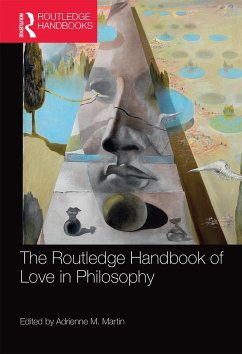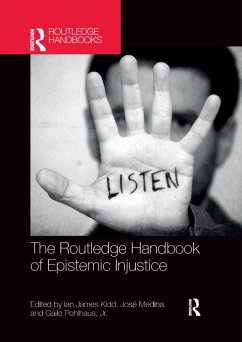
The Routledge Handbook of Philosophy of Agency
Versandkostenfrei!
Versandfertig in 6-10 Tagen
49,99 €
inkl. MwSt.
Weitere Ausgaben:

PAYBACK Punkte
25 °P sammeln!
One of the most basic and important distinctions we draw is between those entities with the capacity of agency and those without. As humans we enjoy agency in its full-blooded form and therefore a proper understanding of the nature of agency is of great importance to appreciate who we are and what we should expect and demand of our existence.The Routledge Handbook of Philosophy of Agency is an outstanding reference source to the key issues, problems, and debates in this exciting subject and is the first collection of its kind. Comprising 42 chapters by an international team of contributors, th...
One of the most basic and important distinctions we draw is between those entities with the capacity of agency and those without. As humans we enjoy agency in its full-blooded form and therefore a proper understanding of the nature of agency is of great importance to appreciate who we are and what we should expect and demand of our existence.
The Routledge Handbook of Philosophy of Agency is an outstanding reference source to the key issues, problems, and debates in this exciting subject and is the first collection of its kind. Comprising 42 chapters by an international team of contributors, the Handbook is divided into eight clear parts:
The Metaphysics of AgencyKinds of AgencyAgency and AbilityAgency: Mind, Body, and WorldAgency and KnowledgeAgency and Moral PsychologyAgency and TimeAgency, Reasoning, and Normativity.
A broad range of topics are covered, including the relation of agency to causation, teleology, animal agency, intentionality, planning, skills, disability, practical knowledge, self-knowledge, the will, responsibility, autonomy, identification, emotions, personal identity, reasons, morality, the law, aesthetics, and games.
The Routledge Handbook of Philosophy of Agency is essential reading for students and researchers within philosophy of action, philosophy of mind, metaphysics, philosophy of psychology, and ethics.
The Routledge Handbook of Philosophy of Agency is an outstanding reference source to the key issues, problems, and debates in this exciting subject and is the first collection of its kind. Comprising 42 chapters by an international team of contributors, the Handbook is divided into eight clear parts:
The Metaphysics of AgencyKinds of AgencyAgency and AbilityAgency: Mind, Body, and WorldAgency and KnowledgeAgency and Moral PsychologyAgency and TimeAgency, Reasoning, and Normativity.
A broad range of topics are covered, including the relation of agency to causation, teleology, animal agency, intentionality, planning, skills, disability, practical knowledge, self-knowledge, the will, responsibility, autonomy, identification, emotions, personal identity, reasons, morality, the law, aesthetics, and games.
The Routledge Handbook of Philosophy of Agency is essential reading for students and researchers within philosophy of action, philosophy of mind, metaphysics, philosophy of psychology, and ethics.













